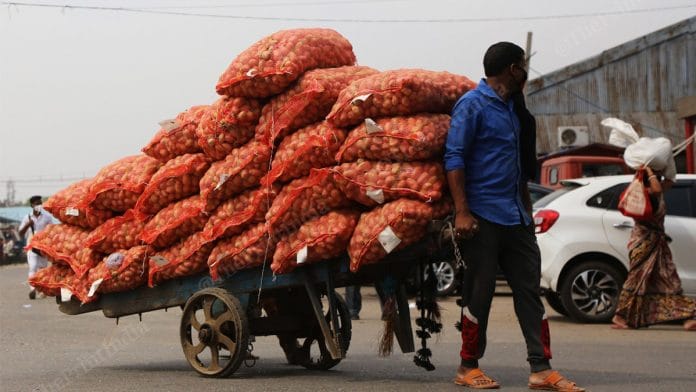
 A long haul, spend wisely, but don’t skimp on the truly needy
A long haul, spend wisely, but don’t skimp on the truly needy
Amartya Sen | Nobel Laureate in Economics
Raghuram Rajan | Former RBI Governor

Abhijit Banerjee | Nobel Laureate in Economics
The Indian Express
As the duration of the lockdown remains unprecedented, Nobel laureates Sen and Banerjee and former RBI governor Rajan write an exclusive Page 1 opinion piece in the Express.
They say that the “biggest worry” is that a large number of people will be pushed into dire poverty. They call for the urgent need to do what it takes to reassure people that their minimum well-being will be secured. They also assert that giving away some of the existing food stocks at the time of a national emergency “makes perfect sense”. The three eminent economists also suggest issuing temporary ration cards for over six months. They maintain that while we need to spend wisely given the large demand for fiscal resources, however “skimping on helping the truly needy” will make sure that we “lose the plot”.
 Craftspeople have always made in India. They now need state support
Craftspeople have always made in India. They now need state support
Jaya Jaitly | Former president of the Samata Party
The Indian Express
Pointing out the absence of craftspeople from the financial package offered by the government, Jaitly argues, “Unless there is recognition and support for our 50 million skilled artisans and craftspeople through enabling sustainable livelihoods, many can be driven to penury and heritage skills will die.” With cancelling of bulk orders, shortage of raw material, low stock of rations, a possible drop in sales post lockdown and lack of supplies, the problems faced by them seem endless. Jaitly suggests that “interest-free loans of Rs 5,000-Rs 10,000 per month per family for two months backed by the government” are required and the government should avoid “one-size-fits-all schemes”.
 Who’s afraid of WHO?
Who’s afraid of WHO?
Chitra Subramaniam | Founder, CSD consulting, a Geneva-based company working at the crossroads of public health, development and communications
Indian Express
Subramaniam states that “China is scripting the emerging economic story of coronavirus and knows the untold story of the COVID pandemic” and India needs to be wary. China’s control over the WHO and its creeping dominance in the public health sector is a wake-up call for New Delhi, says Subramaniam. Director general of the WHO, Tedros Adhanom’s way of handling the pandemic and his subservient nature to China has earned a lot of criticism. “That ship of trust, the cornerstone of public health work that the WHO should have been leading, has long set sail,” she writes. Subramaniam ends by saying that during a time like this “New Delhi must decide if it wants to blindly follow the blind or lead by bringing the WHO back to its original promise.”
 This is the time to ensure systemic legal reform
This is the time to ensure systemic legal reform
Maja Daruwala | Senior adviser, Tata Trusts and Commonwealth Human Rights Initiative
Hindustan Times
When the country entered the nationwide lockdown on 25 March, delivering law and order was not part of the list of essential services, writes Daruwala. She argues that this time the justice system needs to reform by building “on interim measures, leverage technology, and go back to fundamental principles.” In order to follow social distancing, Daruwala suggests that “bail, not jail, is the rule and to utilise alternatives to imprisonment such as probation, paroles and furloughs.” As we have now entered the second phase of the lockdown, the legal system must go back to fundamental principle. “For the justice-seeker, every matter is urgent. But matters relating to personal liberty or protection from predators — whether private or state agents — are not something that can wait.”
Getting the containment strategy in India right
George Thomas | Orthopaedic surgeon at St. Isabel’s Hospital, Chennai
The Hindu
Addressing the contagious nature of coronavirus and the lockdown in India, Thomas states that “an effective response must consider not only pathogen behaviour but also socioeconomic and cultural characteristics”. Countries like South Korea, Singapore, Taiwan and Japan that have been successful in containing the disease have done so by government-funded mass screening, mass testing and lockdowns that they can afford. India’s poor are vulnerable and “if the Central government is serious about the containment strategy proposed by the Ministry of Health and saving lives irrespective of social class, it must provide economic and social resources on a massive scale.”
 COVID19: Creating a paradigm shift in India’s education system
COVID19: Creating a paradigm shift in India’s education system
Dr Ashwini Kumar Sharma | Pro Chancellor, Vijaybhoomi University and Former DG, NIELIT, Govt of India
The Economic Times
Sharma asserts that a key aspect of handling the coronavirus outbreak is to make sure services are being delivered. Students are having to make huge adjustments now that classes have turned online. He maintains that the Digital India version of the government is now emerging as a “vital instrument” for solving this crisis. This time calls for an opportunity to deploy new tools to make education delivery meaningful to those students who can’t make it to campuses. In the future, this technology can be used to recruit the best faculty available across the globe. Sharma observes that in the times to come, students may be allowed to continue courses from any college based on the quality of their teacher and fee.
 Stop or slow?
Stop or slow?
Naushad Forbes | Co-Chairman, Forbes Marshall
Business Standard
Forbes notes that India’s lockdown has resulted in halting most manufacturing, construction, shutting of airline services, hotels and malls etc. Forbes suggests four focus areas to help the economy during lockdown, first there lies an urgent need to address those in the informal sectors. Second, the government must address employment in enterprises. Third, Forbes asserts that it is time to restore manufacturing. Fourth, the government must get logistics moving again. A “quick economic recovery” needs that the government preserve jobs and keep the economy going.
Reform for the next generation
Kanika Datta | Columnist
Business Standard
For Datta, what is striking about the crowd of migrant labourers making their way home in Bandra and Surat is their “relative youth”. She asserts that they are the “biggest non-medical victims” of the outbreak despite falling in the low-risk infection age group. Moreover, the dire state of the economy before the pandemic suggests that India must not rely on “business-as-normal paradigms”. India must not let this large percentage of the population to “wallow in near-destitution and depend on the variability of state handouts”. This crisis offers politicians a chance to make a platform for next-generation reform which will go beyond the “usual entitlement schemes”. They need to seriously address the problem of easing ‘Doing Business’ metrics for small and medium enterprises.
Today’s Editorials
The Hindu: The daily calls US President Donald Trump’s move to halt WHO funding “disastrous and unthinkable”. This will not only impact the functioning of the global body but also hurt humanity. WHO cannot independently investigate but can only rely on member-countries to share the information. Hindu claims that there has been no instance when the international body has been found covering up China as alleged by Trump, rather it has been urging to aggressively test and contain the spread. The daily writes that perhaps Trump’s decision is linked to a ‘desperate bid to hide his own failures’.
The Times of India: The partial resumption of economic activities from next week announced by the government is a welcome step, writes TOI. As the world is headed into the worst recession ever in about nine weeks, India needs a calibrated fiscal package to complement the measures announced just after the lockdown began. It also comments that the severity of the current lockdown needs to end on 3 May.
Hindustan Times: The newspaper writes about the gathering of migrant workers in Bandra and calls it disturbing. These workers longing to go home represent a sense of desperation, which is emerging from economic suffering and emotional anxiety, notes HT. However, these gatherings can also begin another chain of transmission, which can set back India’s efforts in the battle against the pandemic. The workers need direct food and financial support from the government and more sensitive communication, the daily suggests.







Why don’t these smart alecs do something in their country of adoption for permanent residence and leave us to take care of India. We don’t need their motivated advice. As long as their mentor SoGa is out of power they can forget their dreams of getting all the privileges, positions and pecuniary benefits they were getting in her reign.
India is planning to tackle covid19 with iron hand.It is on its way to success.